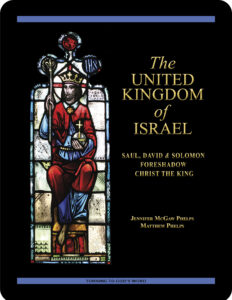 The United Kingdom of Israel:
The United Kingdom of Israel:
Saul, David & Solomon
Foreshadow Christ the King
Lesson 8 David Eludes Saul in the Wilderness
the First Book of Samuel 23:1—24:22
Revised Standard Version Catholic Edition (RSVCE)*
New American Bible Revised Edition (NABRE)*
Catechism of the Catholic Church
ex libris (in our library)
glossary for The United Kingdom of Israel
cross references in The United Kingdom of Israel
next lesson: David & Abigail; David Again Spares Saul’s Life
This material coordinates with Lesson 8 on pages 50–54 in The United Kingdom of Israel: Saul, David & Solomon Foreshadow Christ the King.
“When your days are fulfilled and you lie down with your fathers, I will raise up your offspring after you, who shall come forth from your body, and I will establish his kingdom. He shall build a house for my name, and I will establish the throne of his kingdom for ever.”
—the Second Book of Samuel 7:12–13
welcome to our in-depth study of Saul, David & Solomon
We invite interested groups and individuals to check out the sample first lesson from this 28- lesson
lesson  Turning to God’s Word Catholic Bible study. These online study pages link to our free lesson videos, as well as to a glossary and cross references in the biblical text. Other study aids include maps, additional commentary, and prayers based on the primary Scripture in each lesson. The United Kingdom of Israel: Saul, David & Solomon Foreshadow Christ the King has been granted an imprimatur and may be purchased from our website shop. If you have a Bible-study question or comment, click on the “ask us your question” or “what do you think” button on any study page.
Turning to God’s Word Catholic Bible study. These online study pages link to our free lesson videos, as well as to a glossary and cross references in the biblical text. Other study aids include maps, additional commentary, and prayers based on the primary Scripture in each lesson. The United Kingdom of Israel: Saul, David & Solomon Foreshadow Christ the King has been granted an imprimatur and may be purchased from our website shop. If you have a Bible-study question or comment, click on the “ask us your question” or “what do you think” button on any study page.
open with prayer
It’s always wise to begin any Bible study with prayer, whether reading the Scriptures alone or meeting with others in a discussion study group. You can pray using your own words or use one of the opening prayers on our website. We especially like the following:
Lord Jesus, you promised to send your Holy Spirit
to teach us all things.
As we read and study your word today,
allow it to touch our hearts and change our lives. Amen.
let’s review—the First Book of Samuel 20:1—22:23
In Lesson 7 The Priest Ahimelech Helps David Flee from Saul, it’s clear that Saul indeed wants David dead. David goes to Nob, where the priest Ahimelech provides David with food and a weapon. The encounter between David and Ahimelech is observed by one of Saul’s henchmen, Doeg the Edomite. David goes on to Gath, where he pretends to be mad in order to avoid problems with the Philistines. David then moves on to Adullam, where he’s joined by relatives and men who have an axe to grind with Saul as ruler. From Adullam, David goes to Moab to seek asylum for his parents. He’s counseled by the prophet Gad to move his base of operations to Judah. Saul continues to seek to kill David. Doeg tells Saul that David was aided by the priests at Nob, and Saul orders the priests at Nob to be murdered. Since Saul’s own servants refuse to slay the priests, Doeg does, also slaying the priests’ families and their livestock. Abiathar, one of the priests, escapes and flees to David, who vows to protect him.
map notes—Keilah, Jeshimon, the Rock of Escape & Wildcats’ Rocks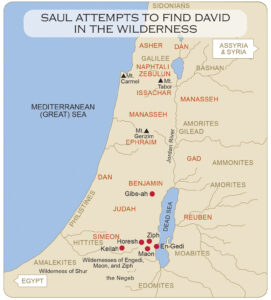
Keilah, the town David liberated from the Philistines, is in the southern part of territory allotted to the tribe of Judah. Saul continues to plot against David, planning to besiege Keilah. After being warned by the LORD, David and his men flee to nearby hill country and wilderness located within territory occupied by Judah. Jeshimon, a name that means desert, refers to the Wilderness of Ziph near the Dead Sea. The Rock of Escape is thought to have been located at Maon. Wildgoats’ Rocks were in the Wilderness of En-Gedi. All of these places are in territory allotted by God to the tribe of Judah. Click on the map (right) to enlarge it. The original map is on page 53 in The United Kingdom of Israel: Saul, David & Solomon Foreshadow Christ the King.
 does David need to inquire of the LORD? (22:01)
does David need to inquire of the LORD? (22:01)
In the First Book of Samuel 23:2 and 23:4, David twice turns to the LORD for  guidance about whether to fight the Philistines attacking Keilah. In the video overview for Lesson 8, “David Eludes Saul in the Wilderness,” Turning to God’s Word author Matthew Phelps discusses the anointed king’s responsibility to defend God’s people against military threats. Some obvious questions occur: How much is David also expected to rely on God’s assistance for guidance and direction in
guidance about whether to fight the Philistines attacking Keilah. In the video overview for Lesson 8, “David Eludes Saul in the Wilderness,” Turning to God’s Word author Matthew Phelps discusses the anointed king’s responsibility to defend God’s people against military threats. Some obvious questions occur: How much is David also expected to rely on God’s assistance for guidance and direction in  military matters? Why might future kings of Israel decide not to follow David’s precedent? What are some of the reasons that they might want to rely on God as David did?
military matters? Why might future kings of Israel decide not to follow David’s precedent? What are some of the reasons that they might want to rely on God as David did?
The Scripture ranges for the videos that accompany this Catholic Bible study from Turning to God’s Word match the Scripture ranges for the sets of questions in The United Kingdom of Israel: Saul, David & Solomon Foreshadow Christ the King. You can follow along as author Matthew Phelps discusses Lesson 8, “David Eludes Saul in the Wilderness,” on pages 50–54 in the study book.
WHAT DO YOU THINK about the king’s responsibility to the people?
Take a few minutes to read “The King Gets to Decide What Is Right” on page 54 in The United Kingdom of Israel: Saul, David & Solomon Foreshadow Christ the King.
 ? Consider why the LORD allows his anointed kings to make decisions that affect the well-being of all the people.
? Consider why the LORD allows his anointed kings to make decisions that affect the well-being of all the people.
? Prior to establishing the monarchy, who primarily was responsible for making important decisions?
? How did that decision-making process work?
? What are some potential downfalls of the earlier decision-making process?
? What are some potential downfalls of a process that allows the king to have final say in all major decisions?
? Who has the primary decision-making role in your life?
? What are the pros and cons of this system?
read the Catechism—spiritual direction can aid in discernment
“David Practices Discernment” on page 53 in The United Kingdom of Israel: Saul, David & Solomon Foreshadow Christ the King addresses how it is that David goes about asking the LORD for counsel. Church teaching in paragraph 2690 in the Catechism of the Catholic Church links Christian discernment to prayer.
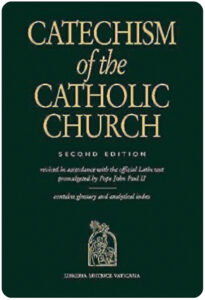 2690 The Holy Spirit gives to certain of the faithful the gifts of wisdom, faith and discernment for the sake of this common good which is prayer (spiritual direction). Men and women so endowed are true servants of the living tradition of prayer:
2690 The Holy Spirit gives to certain of the faithful the gifts of wisdom, faith and discernment for the sake of this common good which is prayer (spiritual direction). Men and women so endowed are true servants of the living tradition of prayer:
According to St. John of the Cross, the person wishing to advance toward perfection should “take care into whose hands he entrusts himself, for as the master is, so will the disciple be, and as the father is so will be the son.” And further: “In addition to being learned and discreet, a director should be experienced … . If the spiritual director has no experience of the spiritual life, he will be incapable of leading into it the souls whom God is calling to it, and he will not even understand them.”
WHAT DO YOU THINK about the practice of discernment?
Compare the way in which David discerns the best course of action with the way that Saul does.
 ? Consider what’s the single most important difference between the two men.
? Consider what’s the single most important difference between the two men.
? What experience do you have turning to God for help in distinguishing the proper course of action when faced with difficult decisions?
? What do you think it is that separates true discernment from the spiritual equivalent of flipping a coin?
? What expectations about God’s response to your concerns might be an unspoken part of your requests for guidance?
? What is one difficult decision that you sincerely would like God’s help in making?
ex libris—two books about spiritual direction
Two of the best books we’ve recently come across that discuss the practical ins and outs of 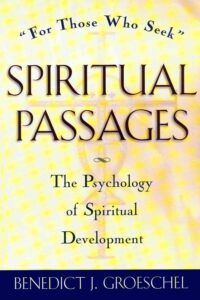
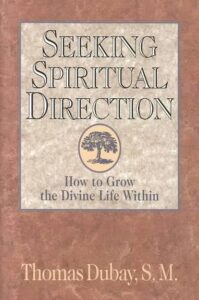 discernment are Spiritual Passages by Benedict Groeschel, C.F.R., and Seeking Spiritual Direction by Thomas Dubay, S.M.
discernment are Spiritual Passages by Benedict Groeschel, C.F.R., and Seeking Spiritual Direction by Thomas Dubay, S.M.  Both authors have written other excellent books as well, but people interested in learning more about spiritual direction may find these two titles particularly insightful. At ex libris—main bookshelf, you can read excerpts from both of these books by Catholic priests, and you also can learn more about other works related to Catholic Bible study.
Both authors have written other excellent books as well, but people interested in learning more about spiritual direction may find these two titles particularly insightful. At ex libris—main bookshelf, you can read excerpts from both of these books by Catholic priests, and you also can learn more about other works related to Catholic Bible study.
judgment belongs to the LORD
In the First Book of Samuel 24:15, David asks that the LORD be the judge between him and Saul. This echoes a strong judgment theme that’s woven throughout the Scriptures. In this particular case, David is indicating a high level of confidence in his own behavior. Based on your general knowledge of Scripture, what are some other biblical situations involving judgment? What can you identify as common to those situations in which one reasonably might expect a favorable outcome? What lesson can Christians learn about leaving issues of judgment to the LORD?
 pray with the Psalms—several obvious connections to this lesson
pray with the Psalms—several obvious connections to this lesson
There’s scholarly dispute about whether David wrote Psalm 142, but the first verse (some translations include this as an introduction prior to the first verse) identifies this Psalm as a prayer of David when he was in the cave. At the very least we can consider it to have been inspired by the situation described in the twenty-fourth chapter of the First Book of Samuel. Psalm 105:14–15 seems to describe with unusual accuracy the reason behind David’s  determination not to harm anyone who’s been anointed by God. Prayed at Sunday First Vespers (Week I), Psalm 142 is included as part of Lesson 1 Set a Guard on My Mouth in the Turning to God’s Word Catholic Bible study Sing a New Psalm: Communicating with God Through the Prayers of the Church—Volume I: Lauds & Vespers. Prayed at Wednesday Vigils (Week 1),
determination not to harm anyone who’s been anointed by God. Prayed at Sunday First Vespers (Week I), Psalm 142 is included as part of Lesson 1 Set a Guard on My Mouth in the Turning to God’s Word Catholic Bible study Sing a New Psalm: Communicating with God Through the Prayers of the Church—Volume I: Lauds & Vespers. Prayed at Wednesday Vigils (Week 1),  Psalm 105 will be included as part of Lesson 7 The LORD Remembers His Holy Word in Volume II: Vigils, Day Prayer & Compline, which is scheduled for publication in late summer of 2025.
Psalm 105 will be included as part of Lesson 7 The LORD Remembers His Holy Word in Volume II: Vigils, Day Prayer & Compline, which is scheduled for publication in late summer of 2025.
rock—you could look it up in our archives
 The Rock of Escape and Wildgoats’ Rocks are prominent geographic locations in this section in the First Book of Samuel. In the New Testament, Peter is renamed Rock, and the cornerstone of the Church is an important concept. Learn about the word “rock” by reading Lost in Translation, an online column in which Turning to God’s Word author Matthew Phelps helps readers connect with ideas expressed in the original languages of the Scriptures. New Lost in Translation entries are posted on Mondays, and past entries are archived on our website. Contact us if you’d like to receive Lost in Translation by email every week.
The Rock of Escape and Wildgoats’ Rocks are prominent geographic locations in this section in the First Book of Samuel. In the New Testament, Peter is renamed Rock, and the cornerstone of the Church is an important concept. Learn about the word “rock” by reading Lost in Translation, an online column in which Turning to God’s Word author Matthew Phelps helps readers connect with ideas expressed in the original languages of the Scriptures. New Lost in Translation entries are posted on Mondays, and past entries are archived on our website. Contact us if you’d like to receive Lost in Translation by email every week.
another reference to David’s heart
The First Book of Samuel 24:5 reports that David’s heart struck him after he had cut off part of Saul’s robe. This once again points to the reason David has been chosen by God to rule the descendants of Jacob—David is a man after God’s own heart. In many ways, therefore, David can be compared to God in that, like God, David desires righteousness in his heart. The ancients understood the heart as the embodiment of everything that makes up a person’s character. In the Gospel According to Luke 6:45, Jesus teaches: “The good man out of the good treasure of his heart produces good, and the evil man out of his evil treasure produces evil; for out of the abundance of the heart his mouth speaks.”
what’s behind Saul’s dangerous attitude?
It’s easy to think ill of Saul, but at least part of his problem has to be related to confusion over his role as king. Saul is the first king to rule the descendants of Jacob, so he has no precedent other than the LORD to look to as a model for how he should behave. The LORD is divine, and this makes it very difficult. Few ordinary people can imagine imitating God. Neighboring kings and rulers are viewed as gods or as having some kind of special connection with gods. For the descendants of Jacob, it’s unfathomable to contemplate the idea of viewing a mortal as a god. How do you suppose that Saul developed the habit of relying on his own strength rather than trusting in God?
WHAT DO YOU THINK about Christians’ call to kingship?
While all Christians are called to share in Christ’s threefold office of priest, prophet, and king, very little attention is paid to how humanity is to connect with the idea of kingship.
? What advantage migtt Christians have over Saul when attempting to imitate divine rule?
? Over what are Christians called to reign?
? What about the image of a king might present-day Christians find appealing?
? What might present-day Christians find difficult to understand about the connection between religion and royalty?
? Consider what’s meant by the term royal priesthood, which Catholics regularly hear in the liturgy of the Mass?
 the best Catholic commentary about Scripture
the best Catholic commentary about Scripture
To find out more about how Church teaching is supported by Scripture passages in The United Kingdom of Israel: Saul, David & Solomon Foreshadow Christ the King, check out the Index of Citations in the Catechism of the Catholic Church. Links (Revised Standard Version Catholic Edition [RSVCE*]) to the primary Scripture passages in the lesson and relevant paragraphs in the Catechism are provided here. Not every passage in the biblical text for this Catholic study is referenced in a Catechism paragraph, however, including the passage in this lesson from the First Book of Samuel 23:1—24:22.
ways our glossary might prove helpful
In addition to providing extra information about geographical locations, our glossary also points out  persons and places mentioned in the biblical text under multiple names or spellings. If you can remember a name but aren’t sure in which lesson it shows up, you can find it in the glossary, which lists every proper noun that appears in the primary biblical text for The United Kingdom of Israel: Saul, David & Solomon Foreshadow Christ the King.
persons and places mentioned in the biblical text under multiple names or spellings. If you can remember a name but aren’t sure in which lesson it shows up, you can find it in the glossary, which lists every proper noun that appears in the primary biblical text for The United Kingdom of Israel: Saul, David & Solomon Foreshadow Christ the King.
to learn more, read more Scripture
If you’re having difficulty with a particular passage of Scripture, it can be helpful to read the relevant  cross references—but looking these up can take time. To make that easier, we’ve compiled the cross references from the Revised Standard Version Second Catholic Edition (RSV2CE)—the translation that we reprint in our study books. That list can be found at the top of every online study page, and it includes links to cross references in the primary biblical text for The United Kingdom of Israel: Saul, David & Solomon Foreshadow Christ the King.
cross references—but looking these up can take time. To make that easier, we’ve compiled the cross references from the Revised Standard Version Second Catholic Edition (RSV2CE)—the translation that we reprint in our study books. That list can be found at the top of every online study page, and it includes links to cross references in the primary biblical text for The United Kingdom of Israel: Saul, David & Solomon Foreshadow Christ the King.
don’t forget about our indexes & extra online material

 If you’re trying to locate information about a specific Scripture passage, you can look it up in the index at the back of the study book or sample lesson. If you want to find a particular commentary, you can look up its title in the topics index. To learn more about another book of the Bible for which there’s a Turning to God’s Word study, visit the online study directories to read the commentaries and watch any accompanying videos. Finally, if you have a question or would like to make a comment about any of our studies, you can use one of the “ask us your question” or “what do you think” buttons to email our authors.
If you’re trying to locate information about a specific Scripture passage, you can look it up in the index at the back of the study book or sample lesson. If you want to find a particular commentary, you can look up its title in the topics index. To learn more about another book of the Bible for which there’s a Turning to God’s Word study, visit the online study directories to read the commentaries and watch any accompanying videos. Finally, if you have a question or would like to make a comment about any of our studies, you can use one of the “ask us your question” or “what do you think” buttons to email our authors.
ex libris—Church documents & books about religious topics
Link to magisterial documents referred to in our Bible studies at ex libris—magisterial documents.  This listing includes significant recent encyclicals as well as a number of historical Church documents. Recommended books related to Scripture study can be found at ex libris—main bookshelf.
This listing includes significant recent encyclicals as well as a number of historical Church documents. Recommended books related to Scripture study can be found at ex libris—main bookshelf.
wondering how to pronounce some of these words?
The following link is to a reading from the New International Version (NIV) Bible. To listen, click on the audio icon above the printed text. Although not taken from the translations used in our study materials, the NIV reading provides an audio guide to pronunciation of words in this lesson’s primary biblical text. A close online version of the translation of the Bible used in Catholic liturgy in the United States as well as an audio guide for daily Mass readings for the current month can be found on the website of the United States Conference of Catholic Bishops (USCCB).
the First Book of Samuel 23:1—24:22 (NIV)
 close with Bible-based prayer related to this lesson
close with Bible-based prayer related to this lesson
Many of our Catholic study groups like to conclude their discussions with a prayer based on the scriptural focus of their lesson, and some participants include Scripture-specific prayer in their individual study. If you’re uncomfortable composing your own Bible-based prayers you can follow our four easy steps. If you prefer, you can use the following prayer based on the biblical text in this lesson in the study book The United Kingdom of Israel: Saul, David & Solomon Foreshadow Christ the King.
O God, from the beginning of Creation
men and women have desired to know
how to distinguish good from evil.
When David chose not to harm Saul because
of Saul’s position as God’s anointed ruler,
Saul acknowledged David’s righteousness before God.
Give us the courage to match our actions
to the faith that we profess in your Son, Jesus Christ,
who by the example of his sorrowful Passion
encouraged us to love our enemies. Amen.
Lesson 9 David & Abigail; David Again Spares Saul’s Life—the First Book of Samuel 25:1—27:12
Lesson 7 The Priest Ahimelech Helps David Flee from Saul—the First Book of Samuel 20:1—22:23
you also may like our study of the Gospel According to John
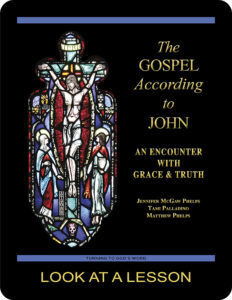 The Gospel According to John: An Encounter with Grace & Truth, a 25-lesson Catholic Bible study with an imprimatur, examines the Fourth Gospel’s view of Jesus Christ as the Son of God, with special emphasis on the institution of the sacraments of the Church as the means by which Christians are purified and made holy. This recently revised study includes maps and additional commentary, and takes a closer look at the way in which Jesus relates to individual men and women. Click on the book’s cover to view a sample lesson.
The Gospel According to John: An Encounter with Grace & Truth, a 25-lesson Catholic Bible study with an imprimatur, examines the Fourth Gospel’s view of Jesus Christ as the Son of God, with special emphasis on the institution of the sacraments of the Church as the means by which Christians are purified and made holy. This recently revised study includes maps and additional commentary, and takes a closer look at the way in which Jesus relates to individual men and women. Click on the book’s cover to view a sample lesson.
start a Turning to God’s Word Bible study
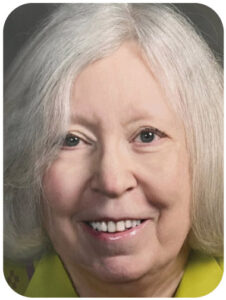 Thank you for your interest in The United Kingdom of Israel: Saul, David & Solomon Foreshadow Christ the King.
Thank you for your interest in The United Kingdom of Israel: Saul, David & Solomon Foreshadow Christ the King.  Information about beginning a Turning to God’s Word Bible study can be found at start a Bible study. Tami, Matthew, and I are available to answer questions. Contact us if you’d like to start one of our studies or have your schedule listed with other TtGW study groups on our website. —Jennifer
Information about beginning a Turning to God’s Word Bible study can be found at start a Bible study. Tami, Matthew, and I are available to answer questions. Contact us if you’d like to start one of our studies or have your schedule listed with other TtGW study groups on our website. —Jennifer
*There are seven deuterocanonical books in the Old Testament—the Books of Tobit, Judith, Wisdom, Sirach, Baruch, and First and Second Maccabees, as well as some passages in the Books of Esther and Daniel. Protestants usually refer to these works as “apocryphal,” a word that means “outside the (Protestant) canon” because they’re excluded from most Protestant Bibles. The word “deuterocanonical” means “second canon”; Catholics use that word to refer to any section of the Catholic Old Testament for which there are no extant, or existing, Hebrew manuscripts. All of the deuterocanonical books appear in the Septuagint, the earliest remaining versions of which date to the 1st century B.C. This Greek translation of the Old Testament was in common use by Jews at the time of Jesus—but the same books aren’t found in existing Hebrew manuscripts, which aren’t as old as the oldest version of the Septuagint. Learn more by reading How Do Catholic & Protestant Bibles Differ?
Turning to God’s Word printed Bible studies use the 2006 Revised Standard Version Second Catholic Edition (RSV2CE) translation for all Scripture references except those to the Psalms, which are taken from The Abbey Psalms and Canticles, prepared by the Benedictine monks of Conception Abbey and published in 2020 by the United States Conference of Catholic Bishops (USCCB). All Scripture links for the online study pages for The United Kingdom of Israel: Saul, David & Solomon Foreshadow Christ the King are to the 1966 Revised Standard Version Catholic Edition (RSVCE) translation. The New International Version (NIV) audio recordings follow the same chapter and verse numbering as the RSV Catholic translations, but the NIV translation doesn’t include the deuterocanonical books and passages.
The 1966 RSVCE uses archaic pronouns and verb forms such as “thee,” “thou,” “didst” in the Psalms and in direct quotations attributed to God. The 2006 RSV2CE replaces those with more accessible English. The few significant translation changes in the RSV2CE include rendering almah as “virgin” in the Book of Isaiah 7:14 and restoring the term “begotten” in the Gospel According to John 3:16.
Numbering varies for some passages in this Bible study. Turning to God’s Word studies (print and digital) follow the numbering in the Revised Standard Version Catholic translations (RSV2CE and RSVCE). Discrepancies in the New American Bible Revised Edition (NABRE) are noted in the Index of Scripture Citations in the study book and the online sample.
 You can learn more about the Psalms by viewing a sample lesson from the Turning to God’s Word Catholic Bible study Sing a New Psalm: Communicating with God Through the Prayers of the Church—Volume I: Lauds & Vespers. The second part of that study, Sing a New Psalm: Communicating with God Through the Prayers of the Church—Volume II: Vigils, Day Prayer & Compline, is scheduled for publication in 2025. Some verse numbers may vary in different translations of the Psalms.
You can learn more about the Psalms by viewing a sample lesson from the Turning to God’s Word Catholic Bible study Sing a New Psalm: Communicating with God Through the Prayers of the Church—Volume I: Lauds & Vespers. The second part of that study, Sing a New Psalm: Communicating with God Through the Prayers of the Church—Volume II: Vigils, Day Prayer & Compline, is scheduled for publication in 2025. Some verse numbers may vary in different translations of the Psalms.
